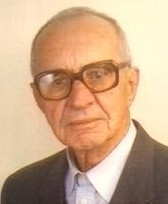Daniel Comboni
Comboni Missionaries
Institutional area
Other links
Newsletter
In Pace Christi
Benini Igino
The last of eleven children, Fr. Igino Benini came from a deeply Christian family who tilled the soil. It was in the environment of his family and parish that his vocation had its roots. “I was eleven years old when I won the Roma Award in the catechism contest of the Associazione Fanciulli Cattolici d’Italia and I was chosen to represent the diocese of Verona before Pope Pius XI. Once back home, I felt in myself an ardent desire to become a priest. So it was that I finished primary school and entered the diocesan seminary. What great sacrifices on the part of my parents and all my family! However, I learnt the lesson that it is necessary to make great sacrifices and much self-denial to gain anything in life”.
While he was in the seminary his missionary vocation matured: “I used to envy the Comboni seminarians who attended school with us and they all seemed like saints to me as they bore in their hearts the greatest ideal that one can possibly imagine: to bring Jesus to those who do not know him. Their ideal fascinated me. For some years I resisted the voice of the Lord, until I finally surrendered and gave in to the voice of the Spirit”. In his diary Fr. Igino continues: “One day at the end of 1946, while the village band played as though for a feast, in a carriage decorated with flowers and bunting, I was about to leave for Africa. There were the final tears, a mother’s embrace and my blessing with the feeling that we would never again meet on this earth – as in fact things turned out”.
After a period of ‘running in’ at the mission of Mupoi, Fr. Igino was diverted to Naandi and on 19 January 1952 to Nzara as superior of that mission which was just at its beginnings. In fact it bears the date of 31 October 1951.
Nzara was in the area reserved for Protestants, but Fr. Igino, with his friendly personality, convinced the authorities to make room for him and transformed the humble chapel into a beautiful church with houses for the priests and Sisters.
The mission diary thus sums up the work of Fr. Igino and his confreres: “They work in harmony and with much joy, insisting on the formation of catechists, the explanation of the catechism, the visits to the villages and the lepers and in the exercise of charity”. “The love for catechism - Fr. Igino continues - was taught to me by Fr. Ernesto Firisin, the man of the Word of God, one who greatly exemplified the Comboni charism – humble, a zealous apostle, of intense spiritual life, one who really knew how to make common cause with all.”
One of the first initiatives Fr. Igino introduced at Nzara was the Legion of Mary, certain that Our Lady would work marvels. And so it was. Then he founded the Bino Eklesia (the field of the Church): every Christian had to set aside a small piece of his field to cultivate produce for the poor. The arrival of the Sisters on 22 May 1954 helped to resolve the problem of the formation of the women and girls.
The Peregrinatio Mariae, which Fr. Igino organised in all the villages, served to increase the faith and devotion to Our Lady.
In 1960 Fr. Igino was expelled from South Sudan. However, he had the privilege of staying in Khartoum where he continued his missionary life as if he had just arrived from Italy, without as much a word of regret for his expulsion from the South. He was certain that if God wanted him to be in Khartoum He had his reasons. In fact Providence prepared an abundant harvest for him.
In 1977 we find him in the parish of St. Joseph, canonically erected that very year. For 25 years Fr. Igino also directed the groups of young people (nadi) who were fleeing from the South because of the war.
He taught them the prayers and the catechism and, when they were ready, they were baptized. Besides being an evangeliser, he was a man of charity towards all those poor and needy people.
The amount of good which Fr. Igino did was immense because he never tired of catechising. He made use of the catechism of Pius X and prepared a couple of prayer books in English and in Zande to meet the needs of the young people from the South who did not know Arabic.
When in 1990 the opportunity came to return to South Sudan, he was the first to leave, despite his advanced age and the still dangerous situation due to the war. In 1994 he had to return home for health reasons. He went to Gozzano where he spent the remaining eleven years of his life in ministry (he was always looking forward to it) and looking after the kitchen garden.
A few months before his death, Fr. Igino had gone to Milan for medical treatment. There, during the celebration of Vespers on 28 September 2005, the Lord called him. After the funeral in Milan, his remains were taken to Verona where they lie in the Comboni chapel of the city cemetery.
Da Mccj Bulletin n. 230 suppl. In Memoriam, aprile 2006, pp. 13-30.

